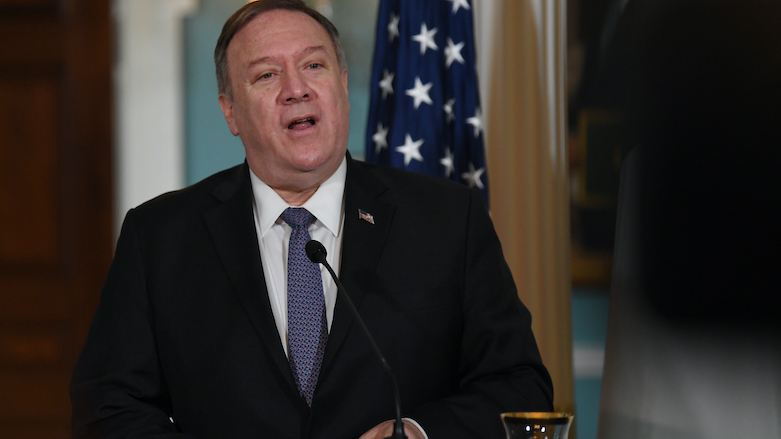US condemns Syria, Russia, and Iran for escalating attacks in Idlib province
Idlib is the last remaining rebel-held province in Syria, and the regime, along with its Russian and Iranian allies, have slowly been moving to establish Damascus’ control.

WASHINGTON DC (Kurdistan 24) – US Secretary of State Mike Pompeo issued a statement on Tuesday condemning “the continued, unjustifiable, and ruthless assaults on the people of Idlib by the Assad regime, Russia, Iran, and Hizbollah.”
Idlib is the last remaining rebel-held province in Syria, and the regime, along with its Russian and Iranian allies, have slowly been moving to establish Damascus’ control.
The effort has proceeded sporadically, as intensified fighting, which precipitates the flight of large numbers of refugees, is regularly followed by a ceasefire. However, the ceasefire regularly breaks down, when Syria and its allies decide to resume their attack.
The last such ceasefire was brokered by Russia and Turkey last month, on Jan. 9, following the visit of a Turkish delegation to Moscow.
However, Syrian airstrikes six days later signaled the collapse of that agreement. On Monday, shelling from the Syrian regime killed five Turkish soldiers and three civilians working with them in Idlib province.
Turkey responded the same day with air and mortar strikes, killing dozens of Syrian troops, while it also made a point of publicizing its strong response. Indeed, as Turkish Defense Minister Hulusi Akar told journalists, Turkey had hit 54 military targets in Syria and “neutralized” 76 Syrian soldiers.
In condemning the Syrian strike on Turkish forces, Pompeo said, “The Feb. 3 mortar attack on Turkish observation posts by the Assad regime forces is a grave escalation and follows ongoing vicious attacks impacting civilians, humanitarian workers, and infrastructure.”
“We stand by our NATO ally, Turkey” and “fully support Turkey’s justified self-defense actions in response,” Pompeo affirmed.
Speaking by telephone on Tuesday to Russian President Vladimir Putin, Turkish President Recep Tayyip Erdogan warned that “Turkey would continue to use its legitimate right of self-defense in the harshest way in the case of similar attacks from the forces loyal to Bashar Assad,” as Turkish media reported.
At the same time, Erdogan also signaled that he did not want a fight with Moscow, telling reporters, “We do not need to engage in a conflict or a serious contradiction with Russia at this stage.”
“We cannot overlook” our partnerships with Russia, he continued. “That is why we will sit down and discuss everything. Not in anger since it would only bring harm.”
Averting a Renewed Refugee Crisis
David Swanson, the spokesperson for the UN Office for the Coordination of Humanitarian Affairs, similarly warned on Tuesday about the humanitarian crisis in Idlib.
“Since Dec. 1, some 520,000 people have been displaced from their homes, the vast majority – 80 percent – of them women and children,” Swanson said.
Turkey already hosts some 3.6 million Syrian refugees. In his tough stand toward Damascus, Erdogan seeks, at least in part, to avert a new refugee crisis by keeping the forces of the Syrian regime some distance from the Turkish border in order to house the displaced persons in that area.
Turkey is supported by major European countries, who fear that more refugees will again attempt to enter Europe. Despite the good intentions behind the “Arab Spring,” its failure in countries like Syria and Libya has created a major problem for the European Union (EU).
Above all, the influx of refugees that followed, along with the terrorist attacks committed by the so-called Islamic State in the same time frame, have contributed to the growth of xenophobic, right-wing populist movements.
Germany’s Defense Minister, Annegret Kramp-Karrenbauer, called on Monday for “an international approach” to the Syrian crisis, as she noted that the E-3 (Germany, France, and Britain) would continue their discussions with Erdogan.
In 2016, the EU agreed to provide Turkey $6.6 billion to help take care of the refugees in Turkey and stop them from entering Europe.
Ankara, however, has repeatedly complained that the EU aid had fallen significantly short of that sum.
Editing by Karzan Sulaivany